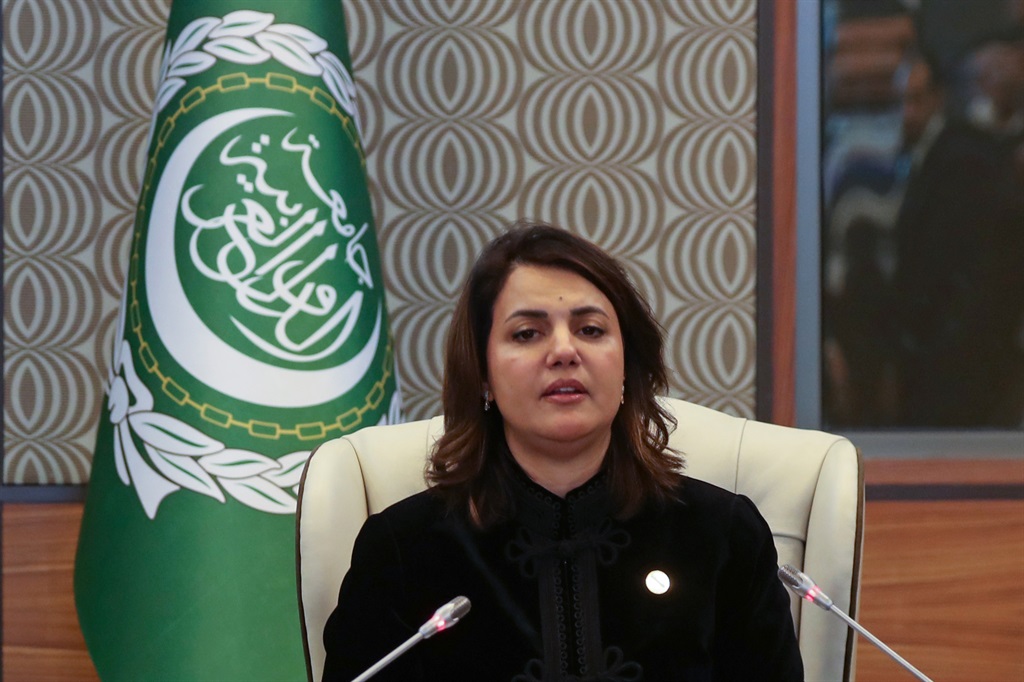
- Libyan PM Abdulhamid al-Dbeibah sacked Foreign Minister Najla Mangoush after she met with Israeli Foreign Minister Eli Cohen in Rome
- The meeting is controversial since Libya does not recognize Israel and supports an independent Palestinian state.
- The meeting has sparked protests in several Libyan cities, adding to the internal political crisis and giving ammunition to Dbeibah's critics.
Libya's prime minister sacked Foreign Minister Najla Mangoush on Monday in an effort to contain a growing furore over Mangoush's meeting with her Israeli counterpart last week, which prompted protests overnight in several Libyan cities.
Mangoush had said her meeting with Israeli Foreign Minister Eli Cohen in Rome was unplanned and informal, but an Israeli official told Reuters it had lasted two hours and was approved "at the highest levels in Libya".
The meeting is contentious because Libya does not formally recognise Israel and there is widespread public support across the Libyan political spectrum for the Palestinian cause of creating an independent state in territory Israel occupies.
The dispute over the meeting has fed into Libya's internal political crisis, giving ammunition to Prime Minister Abdulhamid al-Dbeibah's internal critics at a moment when the future of his interim government was already in question.
Libya has been without a stable central government since the overthrow of Muammar Gaddafi in 2011. Dbeibah's interim government, in office since 2021, is not recognised by some major factions and there is growing political momentum to replace it with a new unified administration aimed at holding national elections.
Protesters demonstrated in front of Libya's Foreign Ministry late on Sunday, causing some damage outside the building, where a large security presence was visible early on Monday. Protests took place in other parts of Tripoli, as well as other cities.
Burning tyres blocked some major roads in Tripoli on Monday but there was no sign of violence.
Mangoush's office tried to quell the anger late on Sunday, saying she had rejected a request for an official meeting with Cohen, but that they had met during an unplanned encounter while she was meeting Italian Foreign Minister Antonio Tajani.
The Israeli official disputed that account. "The meeting was coordinated at the highest levels in Libya and lasted almost two hours. The Libya prime minister sees Israel as a possible bridge to the West and the U.S. administration," the official said.
A
second Libyan official said Dbeibah had asked Italy to arrange the meeting in
the hopes of gaining stronger U.S. and other international backing for his
interim government.
"The government is afraid that international support will get weaker and disappear," the official said.
Since 2020 Israel has normalised relations with the United Arab Emirates, Bahrain, Morocco and Sudan through the so-called "Abraham Accords" brokered by the United States, which sees further agreements with Arab states as a key regional goal.
Diplomacy
Dbeibah's Government of National Unity (GNU), installed through a U.N.-backed process, has pushed for stronger ties with all countries involved in Libya, including the UAE and Israel's main ally the United States.
Libya's parliament based in the east, which rejects the GNU, said on Sunday it would hold hearings into the meeting with the Israeli minister. The Tripoli-based Presidency Council has asked Dbeibah for clarification on the meeting and the High State Council, another important body, condemned it.
After
fighting in Tripoli this month, many Libyans will be watching whether armed
factions opposed to Dbeibah use the dispute as a pretext to move against him.
Diplomacy has focused on national elections to resolve the internal conflict. Last week the U.N. envoy to Libya said a new unified government was needed for a vote to take place, raising questions about international backing for Dbeibah.




 Publications
Publications
 Partners
Partners























